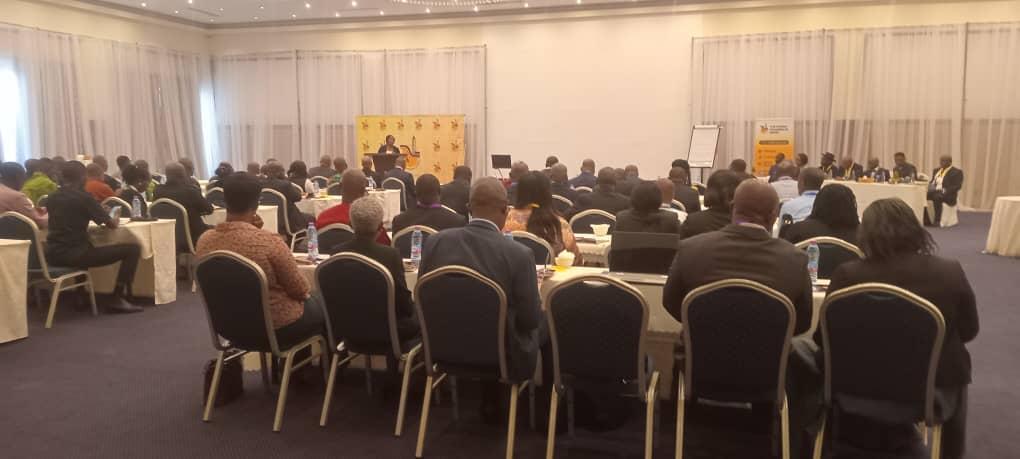Africa-Press – Ghana. Dr. Kenneth Ashigbe, the Chief Executive Officer of the Ghana Chamber of Mines has called for the removal and sanctioning of Metropolitan, Municipal and District Chief Executives (MMDCEs), police commanders and other key state officials whose communities were under the siege by illegal mining activities.
He explained that these key officials who sat aloof for this deadly venture to thrive in communities are either accomplices or benefiting from the nefarious acts.
Mr. Ashigbe, at the opening of a three-day workshop on Mining Laws and Security for selected judges, prosecutors and investigators, noted how strict enforcement of the law was crucial to save the country from the ravages of illegal mining.
He said currently, Ghana had only three companies exploring in the name of responsible and sustainable mining.
However, illegal mining activities continued to take a heavy toll on the country, a crisis in waiting.
The Chief Executive, while calling on the government to stop the activities of illegal mining, reminded participants of the effects of the incessant mercury on the waters and lands.
He said: “These chemicals are non-biodegradable; who are those bringing them into the country even against the Minamata Convention; and we cannot trace, arrest and prosecute?”
He advised the participants to go back and dispense justice in the interest of the state.
His Lordship Justice Tanko Amadu, Justice of the Supreme Court of Ghana and Director of the Judicial Training Institute said issues of illegal mining was topical in Africa and Ghana
“The paradox about being rich in mineral resources, yet poor in development remained the most cited quagmire on mining and development in Africa,” he said.
Justice Amadu described the seminar as timely and essential in the quest for development and protection of the environment…adjudicators and prosecutors stand at the cross-roads among other principal stakeholders in the Mining Industry.
Justice Amadu said the approach to prosecuting and adjudicating mining offences, determining rights and liabilities of stakeholders in the industry, and attitude towards the policies of the state on mining in adjudicatory functions, was most pivotal in dealing with issues of mining and mineral resources in the country.
He indicated that the law, the legal community and institutional presence cannot be overemphasized in regulating mining activities to safeguard and protect the environment for posterity.
“It is from these constitutional yardsticks, that the Minerals and Mining Act, 2006 (Act 703) has been promulgated” he noted.
The Minerals and Mining Act, 2006 (Act 703), under Section 18(1) stated that, before undertaking an activity or operation under a mineral right, the holder of the mineral right shall obtain the necessary approvals and permits required from the Forestry Commission and the Environmental Protection Agency for the protection of natural resources, public health and the environment.
Justice Amadu said: “We are in crucial times with illegal mining activities that continue to ravage communities. With these challenges confronting us, the security agencies must be mobilized to confront this dangerous enterprise.”
He added: While, “the government and other stakeholders like the Ghana Chamber of Mines in strategising and investing to eradicate or at least reduce the menace, the judiciary has no option but to ensure fidelity to their oaths of office and be more pragmatic in contributing to protect and salvage the deteriorating ecosystem; an existential threat which can be likened to a nuclear attack.”
Justice Amadu indicated that, though the statute has undergone a few amendments, the reforms introduced focused largely on fiscal arrangements and administrative clarity.
He said environmental governance and sustainability appeared to have not been adequately addressed.
Justice Amadu added that despite calls for comprehensive reforms, Act 703 was yet to be fully aligned with relevant regional and international environmental standards.
“As a judiciary sensitive to the danger the statutory vacuum can create for purposes of enforcement, we call for a better reflection on universal contemporary mechanisms in ecological protection, community participation and intergenerational equity for the future”.
He entreated all participants to take away useful lessons from the discussions for a positive impact on adjudication and law enforcement processes in confronting the canker of illegal mining in the country.
For More News And Analysis About Ghana Follow Africa-Press







